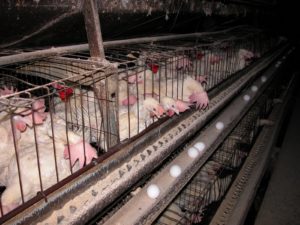In this week’s 2008 election, California unanimously voted to dismantle some of the animal factory farming industry’s most restrictive confinement practices. Restrictive being the operative word. The law that goes into effect in 2015 will phase out: 1) gestation crates that virtually immobilize sows throughout their pregnancies; 2) veal crates where male dairy cows are anemically confined; and 3) “battery cages” that afford a laying hen no more living space than a standard piece of copy paper and six to seven companions.
Of these three confinement systems, California’s egg industry will be the most severely affected. The Los Angeles Times estimates the size of the state’s flock of egg-laying hens at 20 million. Hog and veal operations are limited throughout the state, the nation’s largest agricultural producer. Throughout the campaign, conventional egg producers threatened to move their operations across state lines or even south of the border if Proposition 2 passed, sounding alarms that California’s egg supply could face food safety threats. With the passage of the law, egg producers who do choose to stay in business will have to shift their operations to free-range systems, a small but swiftly growing segment of the national market.
 Proposition 2 was championed by the Humane Society of the United States, Farm Sanctuary, and the California Veterinary Medical Association, among many others. The opposition included egg and hog producers farmers both in and outside the state, as well as the American College of Poultry Veterinarians, who claimed the law would be economically disastrous for California egg producers and raise prices for consumers.
Proposition 2 was championed by the Humane Society of the United States, Farm Sanctuary, and the California Veterinary Medical Association, among many others. The opposition included egg and hog producers farmers both in and outside the state, as well as the American College of Poultry Veterinarians, who claimed the law would be economically disastrous for California egg producers and raise prices for consumers.
California has long considered a bellwether for political, economic, and cultural trends across the nation and the world. And for this reason the campaign was hard fought, with both sides raising $8.5 million for their effort, according to the Los Angeles Times. Both sides also see this as a sign of a national snowball against animal factory farms—perhaps not just on confinement systems, but on environmental and labor violations, greenhouse gas emissions, as well as grain subsidies that all together, have created a nightmarish and unsustainable meat, dairy, and egg production supply. (Also the subject of an upcoming Watershed Media book, The Animal Factory.)
What we are witnessing here is the emergence of ethics and food production issues not just in a state referendum but in what could soon be a national policy dialog. There is little time to celebrate, however. While Californians passed this step toward humane farming, the Bush Administration eased restrictions on feedlots and Confinement Animal Feeding Operations (CAFOs). Under just issued EPA requirements, large livestock facilities (whose waste flows often exceed those of small cities) can avoid obtaining pollution permits as long as they claim they will not harmfully discharge into nearby waterways.
Sure, we believe you’re not dumping your shit in the creeks, streams, and waterways!
The new voluntary compliance law is unimaginable in its neglect of the public trust. It is part of the final act of an administration which will no doubt be remembered for its cronyism, corruption, contempt of government, and transfer of the public treasury and well being to the private sector.
And while Californians voted in favor of the first African American president, for more humane treatment for animals, and in support of a high-speed passenger rail system, we also voted for a restriction of marriage between a man and a woman.
Obviously, there are still more miles to travel and mountains to climb and not a moment to lose. As my classics professor said to me upon my completion of undergraduate work, “Go forth and be frustrated.” But don’t forget the hope for a better world delivered in the 2008 election.
For a sense of the potential ripple effect of California’s Humane Farming Act, check out this article in the Des Moines Register